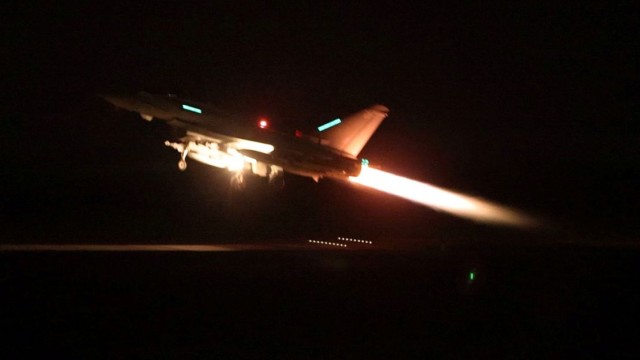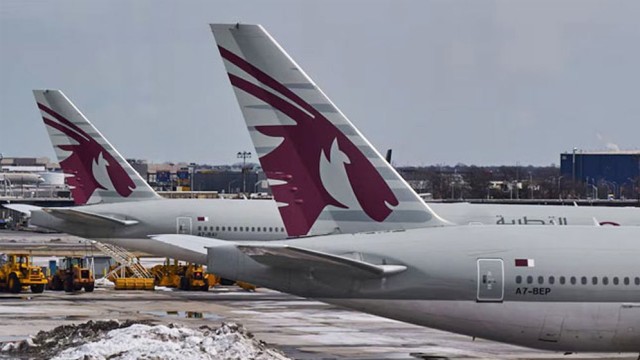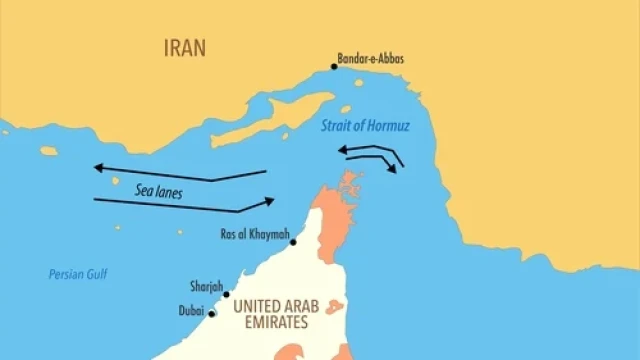"America and Britain will have to prepare to pay a heavy price and bear all the dire consequences of this blatant aggression:" Al-Ezzi
Following weeks of disruptions caused by attacks on Red Sea commerce by Iran-backed Huthi militants, heavy airstrikes by the US and Britain hammered targets in rebel-held Yemen early on Friday.
The Huthi rebels' Al-Masirah TV station reported that the strikes targeted an airbase, airports, and a military camp. AFP correspondents and witnesses also reported hearing bombardments.
Huthi Deputy Foreign Minister Hussein Al-Ezzi reportedly stated, "Our country was subjected to a massive aggressive attack by American and British ships, submarines, and warplanes," as reported by official rebel media.
"America and Britain will have to prepare to pay a heavy price and bear all the dire consequences of this blatant aggression," he stated.
Unconfirmed photos circulating on social media, some allegedly taken at the Al-Dailami airbase north of Sanaa, featured explosions lighting up the sky accompanied by loud bangs and the sound of jets taking off.
Following the attacks in the Red Sea, US President Joe Biden described the US and British strikes as a "defensive action" and declared that he "will not hesitate" to order additional military action if necessary.
According to multiple US media outlets, fighter planes and Tomahawk missiles were used in the strikes. When AFP contacted US officials, they did not immediately corroborate the reports.
"Today, at my direction, US military forces -- together with the United Kingdom and with support from Australia, Bahrain, Canada, and the Netherlands -- successfully conducted strikes against some targets in Yemen used by Houthi rebels to endangeAr freedom of navigation in one of the world's most vital waterways," Biden said in a statement, using a different spelling for the Huthi.
He described the strikes as a "direct response" to the Huthis' "unprecedented" actions, adding that "anti-ship ballistic missiles were used for the first time in history."
"These attacks have endangered US personnel, civilian mariners, and our partners, jeopardised trade, and threatened freedom of navigation," he stated.
"I have no qualms about taking additional steps to safeguard our citizens and the unhindered flow of global trade."
- Saudi Arabia's "grave worry"-
The UK Prime Minister, Rishi Sunak, said in a statement that the strikes were "necessary and proportionate".
"De-escalation of tensions and restoration of stability in the Red Sea remain the goals," according to a joint statement from the United States, United Kingdom, Australia, Bahrain, Canada, Denmark, Germany, Netherlands, New Zealand, and South Korea.
"But let our message be clear: we will not hesitate to defend lives and protect the free flow of commerce in one of the world's most critical waterways in the face of continued threats," it concluded.
Recommendations were made not to escalate by neighbouring Saudi Arabia, which is attempting to withdraw from its nine-year conflict with the Huthis.
A statement from the foreign ministry said, "The Kingdom of Saudi Arabia is following the military operations with great concern" and urged "self-restraint and avoiding escalation."
Since Hamas's historic strike on Israel on October 7, the Huthis have launched an increasing number of attacks on what they believe to be Israel-linked vessels on the vital international route, sparking the start of the Gaza War.
According to Biden's remarks, the Huthis "launched their largest attack to date -- directly targeting American ships" on January 9.
The Western strikes run the risk of escalating the already volatile Middle East scenario into a larger conflict that pits Israel and the US against Iran and its allies in the area.
The Huthi rebels have launched numerous drones and missiles towards Israel, claiming they are responding to Israel's shelling of Gaza.
As a member of the Iran-backed "axis of resistance" positioned against Israel, the group has seized control of a significant portion of Yemen since a civil war broke out there in 2014.
"Repercussions" -
Although Washington has been wary of the possibility of further escalating regional tensions, it had sent a series of increasingly severe warnings to the Huthis to cease the shipping attacks.
In December, Washington organised an international alliance known as Operation Prosperity Guardian to safeguard the region's maritime traffic, which accounts for 12% of global trade.
Later, on January 3, the Huthis were threatened with "consequences" if they did not immediately cease their attacks on commercial vessels by a group of twelve countries led by the United States.
However, US and British forces shot down 18 drones and three missiles late on Tuesday, in what London dubbed the Huthis' most important strike to date as Yemeni rebels.
The US military claimed that the Huthis had fired an anti-ship ballistic missile into a shipping channel in the Gulf of Aden on Thursday, seemingly marking the last straw for the Western allies.
According to the US Navy, it was the 27th strike on foreign shipping in the Red Sea since November 19.
A global economic shock has been feared as a result of shipping corporations rerouting around South Africa's Cape of Good Hope due to the escalating attacks.
Following the assaults on Israel on October 7, the United States promptly bolstered its military posture in the area and cautioned Iran and its allies against exacerbating the situation.
The Biden administration was first hesitant in its response because it is working to maintain the tenuous ceasefire in Yemen, where a military operation led by Saudi Arabia and a decade-long civil conflict have resulted in one of the greatest humanitarian catastrophes in the world in the poorest nation on the Arabian Peninsula.
News Sorce: AFP































Comment: